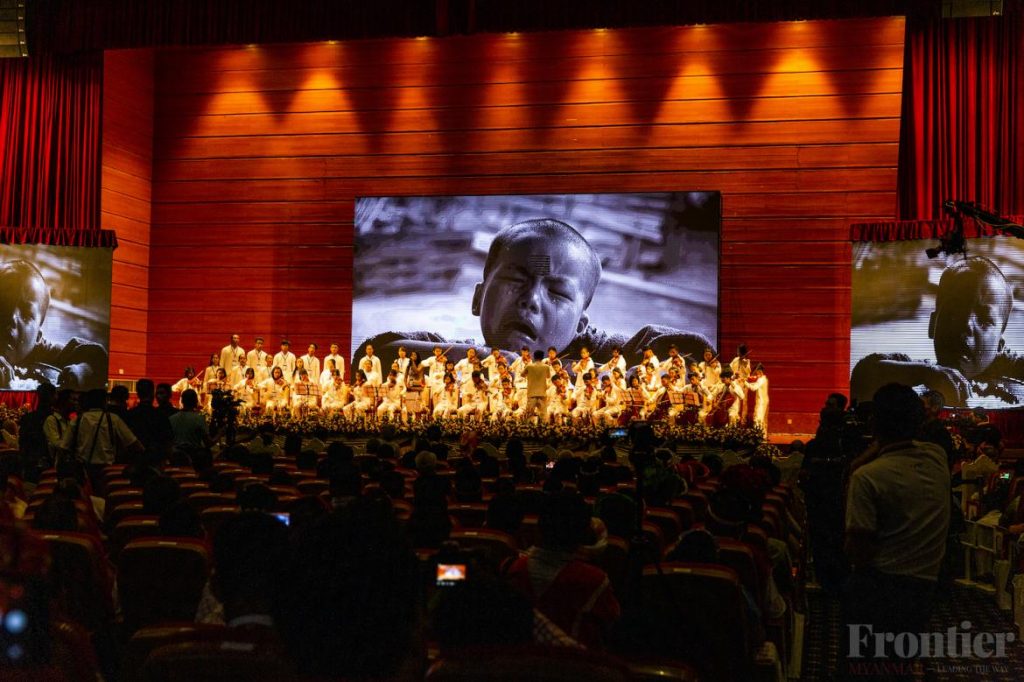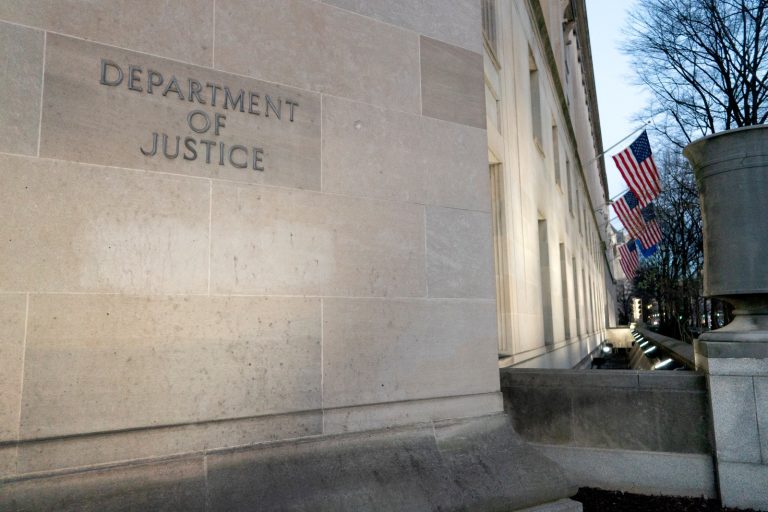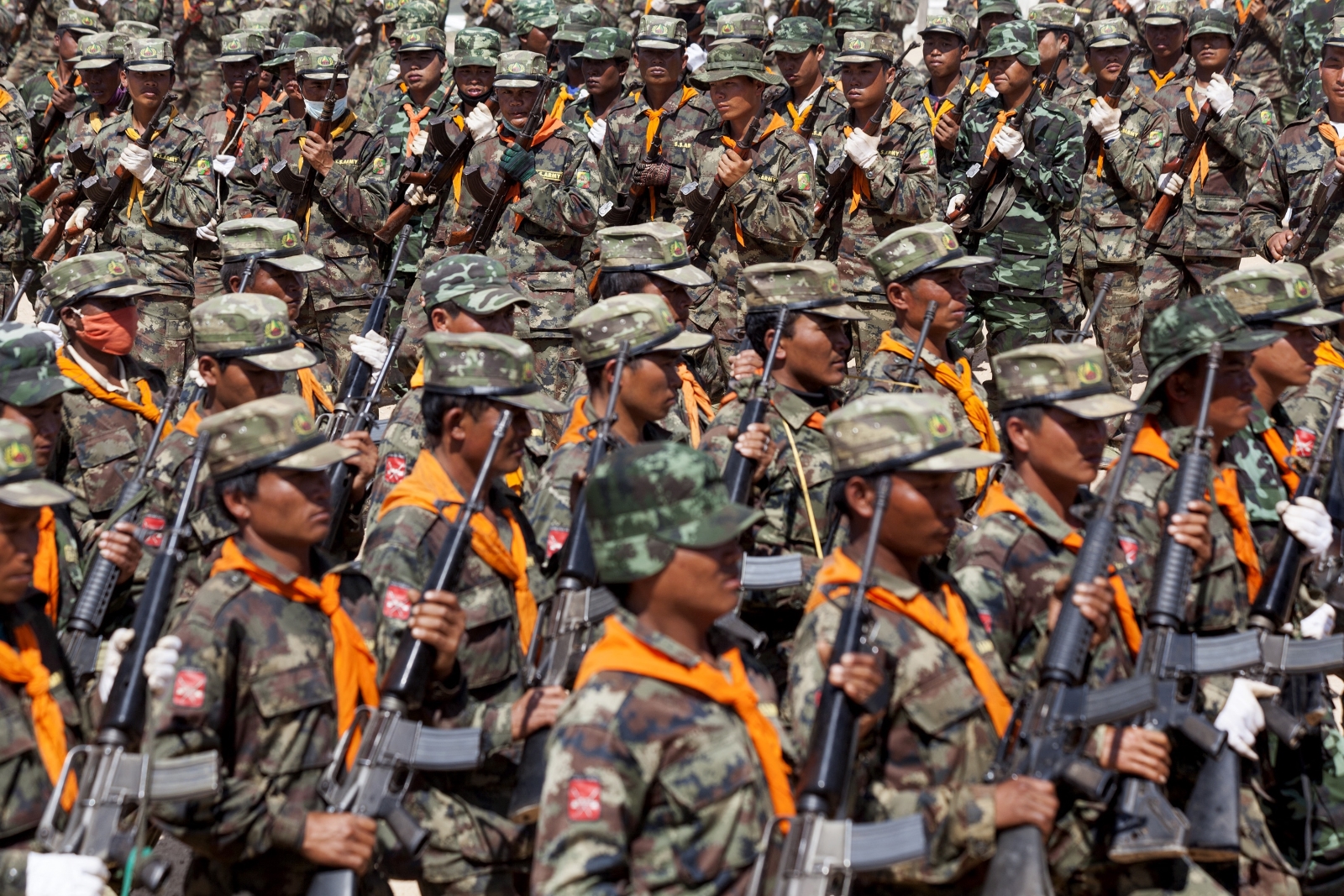The fourth anniversary of the signing of the Nationwide Ceasefire Agreement should have been a happy occasion but instead brimmed with poignant reminders of the nation’s greatest tragedy.
By SITHU AUNG MYINT | FRONTIER
LATE last month, a ceremony to mark the fourth anniversary of the signing of the Nationwide Ceasefire Agreement was held in Nay Pyi Taw. The government and eight ethnic armed groups signed the NCA on October 15, 2015, but the anniversary event was held on October 28 to enable all signatories to attend. The anniversary of such an historic achievement in the quest for national peace should have been a happy occasion but for various reasons, including the country’s present circumstances, it was not.
Conspicuous by their absence from the ceremony were former president U Thein Sein and his former minister U Aung Min, who played a leading role in the Union Solidarity and Development Party government launching the peace process in 2011. Their absence from the event can be seen as an indication of the poor relations between members of the National League for Democracy government and those of its predecessor.
Another significant absentee was General Yawd Serk, leader of the Restoration Council of Shan State and its armed wing, the Shan State Army-South, one of the largest armed groups to sign the NCA in 2015. The RCSS delegation had arranged to travel by road from its headquarters at Loi Tai Leng to Nay Pyi Taw via Taunggyi, the Shan State capital. In a statement on October 27, the RCSS said it had cancelled the trip because the Tatmadaw had declined to grant permission for the delegation to travel overland from Loi Tai Leng to Taunggyi.
The next day, a Tatmadaw spokesperson said it had refused permission for the road journey because the route was not safe for the RCSS leader. However, Yawd Serk had reportedly been planning to hold talks with Shan people in Taunggyi and the Tatmadaw has sought to block such meetings in the past.
Support more independent journalism like this. Sign up to be a Frontier member.
Because of the travel ban, Yawd Serk said he would also not attend a Joint Implementation Coordination Meeting that was due to be held shortly after the NCA anniversary ceremony.
The original plan for the anniversary event was for the meeting to be addressed by State Counsellor Daw Aung San Suu Kyi, Tatmadaw Commander-in-Chief Senior General Min Aung Hlaing, and Yawd Serk, who was to speak on behalf of the NCA signatories. This speech was instead given by General Saw Mutu Say Poe, the chairman of the Karen Nation Union, which has suspended its formal participation in the peace process.
It is not known whether representatives of ethnic armed groups that do not have a bilateral ceasefire agreement, such as the Kachin Independence Organisation, or those that have signed bilateral ceasefires but are yet to ink the NCA, such as the United Wa State Party, were invited to attend the anniversary as guests.
The October 28 event came amid an upsurge of hostilities in the fighting in Rakhine State between the Arakan Army and the Tatmadaw, and as skirmishes continue in northern Shan between the Tatmadaw and the Ta’ang National Liberation Army, one of four members of the Northern Alliance of ethnic armed groups. On October 26, the AA stopped a riverboat and abducted 58 people, including 14 Tatmadaw personnel and 29 members of the Myanmar Police Force. Fierce fighting erupted when the Tatmadaw launched a rescue mission and many people died.
In his speech at the ceremony, Min Aung Hlaing referred to the coordinated raids by the TNLA, AA and Myanmar National Democratic Alliance Army in Mandalay Region and northern Shan on August 15 and asked if the rights being demanded by ethnic armed groups included the right to launch such attacks. He said that what the Tatmadaw was doing was right and it was only because of ethnic armed groups that peace had not been achieved. In contrast, Mutu Say Poe said peace had not been achieved because doubts, anxiety, an absence of trust and hatred.
In her address, Aung San Suu Kyi offered a three-point proposal for reviving the peace process. They are to continue holding the 21st Century Panglong Union Peace Conferences and develop a plan to continue the process beyond the 2020 election, to involve non-signatories of the NCA in political dialogue, and to ensure the people are able “to taste the fruits of peace”.
It was sad to hear some of what she had to say. “Those who started the armed conflicts are no longer around today,” she said. “While youths in other countries are developing artificial intelligence, virtual communities, industrial revolutions and digital movements, we need to provide assurances to our youths in the ethnic regions.”
Before the speeches, the audience was entertained by two songs. One was composed and performed by young people from Kayah State and was titled, “We cannot do anything without peace”. Scenes from camps for people displaced by conflict and the horrors of war were screened in the background by a projector while the song was performed.
Consider the song’s lyrics. “Child with big eyes, before you know about the world, once you leave the cradle and set your feet on the earth, a battlefield awaits you. Because of differences of opinion and greed, armed conflict cannot be stopped. The future of innocent children remains uncertain. Can’t we have peace? Has love dried up in the midst of dishonesty? Shall we all end up divided by differences? Shall we be driven to becoming a nation without a country?”
The song reminded those present of the sad plight of those living in areas affected by conflict. It brought tears to the eyes of the audience.
Aung San Suu Kyi referred to the plight of ethnic nationalities in her speech.
“It is obvious that those who suffer the most from the armed conflicts are our ethnic national races. Billions of dollars in properties, livelihoods and businesses, as well as invaluable lives and limbs, are lost. Displaced youths are unable to obtain an education and have been left behind in progress and development. The biggest loss is the threat posed by these conflicts to the future of the Union.”
The speeches and entertainment at the ceremony marking the fourth anniversary of the signing of the NCA celebrated not a happy occasion but a tragedy – the tragedy that continues to curse our country 70 years after independence.







